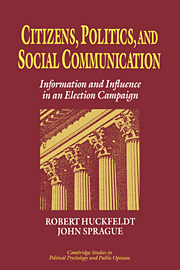Book contents
- Frontmatter
- Contents
- Acknowledgments
- I Democratic politics and social communication
- II Electoral dynamics and social communication
- III Networks, political discussants, and social communication
- IV The organizational locus of social communication
- 11 One-party politics and the voter revisited: Strategic and behavioral bases of partisanship
- 12 Political parties and electoral mobilization: Political structure, social structure, and the party canvass
- 13 Alternative contexts of political preference
- 14 Political consequences of interdependent citizens
- Bibliography
- Index
13 - Alternative contexts of political preference
Published online by Cambridge University Press: 22 March 2010
- Frontmatter
- Contents
- Acknowledgments
- I Democratic politics and social communication
- II Electoral dynamics and social communication
- III Networks, political discussants, and social communication
- IV The organizational locus of social communication
- 11 One-party politics and the voter revisited: Strategic and behavioral bases of partisanship
- 12 Political parties and electoral mobilization: Political structure, social structure, and the party canvass
- 13 Alternative contexts of political preference
- 14 Political consequences of interdependent citizens
- Bibliography
- Index
Summary
This chapter examines the political consequences that arise due to multiple and simultaneous bases of social experience. Two alternative contexts – those of neighborhoods and churches – provide an empirical setting for the effort; and the analysis focuses on two different political attitudes – policy preferences regarding abortion and partisan self-identification. Several questions are addressed: In what manner are the alternative contexts of politics different and in what manner are they similar? To what extent are churches and neighborhoods reinforcing in the political messages they convey, and to what extent do they serve as independent bases of social experience? How do individual differences and individual discretion mediate and deflect the impact of these alternative sources of political influence?
South Bend citizens live simultaneously in a variety of social worlds, any and all of which might have important political consequences. At one and the same time they are rooted socially in neighborhoods, workplaces, churches, clubs, and associations. Indeed, every citizen lies at the center of a social experience produced by a series of intersecting, overlapping, layered environments. Each of the environments, in turn, has potentially important consequences for politics because each serves to modify and deflect the opportunities and constraints that circumscribe social interaction – social interaction that serves as a vehicle for the transmission of political information and guidance.
Individuals and individual differences are important too – they are not simply artifacts of larger social forces.
- Type
- Chapter
- Information
- Citizens, Politics and Social CommunicationInformation and Influence in an Election Campaign, pp. 257 - 281Publisher: Cambridge University PressPrint publication year: 1995

